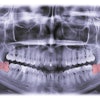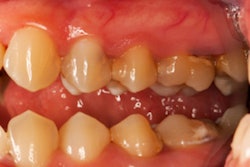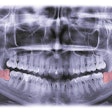
The adjunctive use of antibiotics such as metronidazole (MTZ) or amoxicillin (AMX) during periodontal treatment has been shown to offer short-term benefits (Journal of Clinical Periodontology, April 2010, Vol. 37:4, pp. 353-365). But a new study that looked at the effectiveness of azithromycin (AZM) found that it does not appear to offer the same benefits when treating advanced periodontal disease.
The study, which was presented at the recent International Association for Dental Research conference in San Diego, evaluated the effects of scaling and root planing (SRP) alone or with azithromycin during periodontal treatment.
"We and other research groups have observed in previous investigations that the adjunctive use of metronidazole, or metronidazole plus amoxicillin, with mechanical treatment, leads to important benefits for the patients with advanced periodontal disease," lead author Magda Feres, DDS, chair of the department of periodontology at Guarulhos University, told DrBicuspid.com.
Recently, AZM has emerged as a promising drug with several favorable pharmacokinetic properties that allow for administration only once a day (500 mg) for short periods of time (from three to five days), she explained. This simple dosage protocol and the low incidence of side effects help patient adherence to treatment, she added.
Dr. Feres and her colleagues decided to evaluate the effectiveness of AZM as an adjunct to mechanical treatment of adults with advanced periodontal disease.
Most studies have tested the effect of this antibiotic in patients with a lower degree of disease and found some advantages for its use in association with mechanical treatment, Dr. Feres explained. However, no previous studies have systematically evaluated the effect of AZM in changing the subgingival microbial profile of subjects with very advanced disease.
Randomized trial
Dr. Feres and her colleagues conducted a randomized, double-blind, placebo-controlled clinical trial of 40 subjects with generalized chronic periodontitis.
The patients were randomly assigned to two groups of 20, each receiving either SRP alone (control) or combined with 500 mg of AZM once a day for five days (test). Clinical and microbiological examinations were performed at baseline, three months, and six months post-SRP.
“Apparently, AZM does not seem the best option to treat subjects with advanced periodontal disease.”
— Magda Feres, DDS
The researchers evaluated the samples of the patients for 40 bacterial species that were ordered according to the microbial complexes described by Socransky and colleagues (Journal of Clinical Periodontology, February 1998, Vol. 25:2, pp. 134-144).
Dr. Feres' team found that both therapies led to an improvement in the clinical parameters evaluated without significant differences between them at six months. Subjects in the test group showed a lower percentage of sites with probing depth of 5 mm or more and bleeding on probing at three months post-therapy but not at six months.
The two treatments led to a significant reduction in mean levels and proportion of red complex species, which represent advanced disease, according to the researchers.
"SRP+AZM leads to a modest additional benefit in the composition of the subgingival microbiota in the short-term over that obtained with SRP alone," the authors concluded. "However, at six months post-therapy, this benefit is not fully evident in the clinical parameters."
Dr. Feres said she and her colleagues were surprised by the findings and that they had expected much better results from the antibiotic treatment.
One reason for this lack of effectiveness could be that while MTZ and AMX are bactericidal antibiotics, AZM is bacteriostatic, which could hamper the rapid reduction of the pathogenic microorganisms that are "apparently an important and desirable effect of treatment," Dr. Feres noted.
Some research groups have shown relatively good results for this antibiotic in treating subjects with mild to moderate disease, and it deserves further investigation, she added.
"Dentists and physicians have to bear in mind that the emergence of antibiotic-resistant species is a very important problem of the modern society; and therefore, the choice of using an antibiotic should be strongly supported by the scientific literature," Feres said. "Apparently, AZM does not seem the best option to treat subjects with advanced periodontal disease."
Different results
However, Anne Haffajee, BDS, retired head of the department of periodontology and senior staff member at the Forsyth Institute, has conducted similar research with different results (Journal of Clinical Periodontology, March 2007, Vol. 34:3, pp. 243-253).
Dr. Haffajee and her colleagues compared the clinical and microbiological effects of SRP alone or in combination with systemically administered MTZ, AZM, or low-dose doxycycline in subjects with chronic periodontitis.
"We found that all treatment groups improved clinical parameters, but subjects receiving either adjunctive MTZ or AZM had the best clinical response, particularly at sites with initially deep pockets," she told DrBicuspid.com. "In addition, these subjects showed the greatest reduction in periodontal pathogens (red and orange complex species) compared to the other two groups."
While these results differed from the six-month results reported in the IADR study, Dr. Haffajee noted that in her study the data were reported at 12 months post-therapy.
"It is conceivable that, over a longer post-therapy period, the AZM group described in the abstract may show a better clinical response than the SRP-only group, particularly given the greater decrease in red complex species in the AZM group," she explained.
Antibiotic agents are very effective in subjects who have aggressive forms of periodontal disease and perhaps should be reserved for such cases, Dr. Haffajee added. In addition, she noted, many studies have indicated that, if antibiotics are to be used, the best regimen is a combination of MTZ and AMX, although ideally an antibiotic regimen selected for a given patient should be based on the subgingival microbial profile of that patient for optimal results.
"AZM was examined because, unlike other antibiotics that have to be taken three or four times a day, it is taken once a day, thus potentially improving patient compliance," she concluded. "Nonetheless, most studies suggest that this agent is not as effective as MTZ or the combination of MTZ and AMX."



















